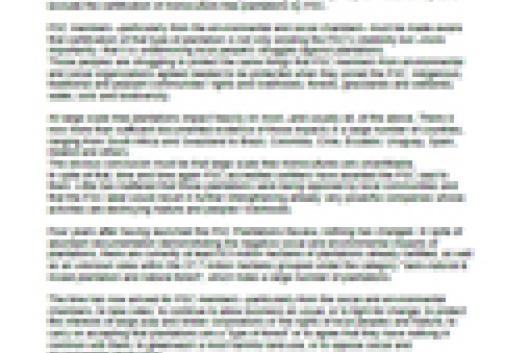Disponible uniquement en anglais.
Subject: The proposal of the California government to include REDD+ offset credits from the state of Acre, Brazil, and from other states and countries with tropical forests.
Montevideo, November 16, 2015
We learned that the California government is moving forward again with the process of including in its carbon trading scheme emission offset credits from forest-related projects such as REDD+. Among others, REDD+ credits from Acre, Brazil, might become eligible if international REDD+ offset credits are accepted by the scheme. REDD+ credits from other countries like México, Nigeria and Indonesia would also possibly be eligible.
We want to remind you that in April 2013 your institution received a letter from a number of organizations from Acre and Brazil who declared their opposition against this proposal. The letter was supported by a solidarity statement from international organizations and individuals.
What strikes us in the current process is the fact that the profound critique from this 2013 letter does not appear, neither during the Public Workshop held by the California Air Resources Board on October 28 in California, nor in the documents that were posted on-line in relation to this Public Workshop . In a PowerPoint presentation , exhibited during the 28 October Workshop, slide number 34 showed a number of organizations that signed a letter in favor of the proposal of the California government. But letters opposing such an inclusion of international REDD+ credits were not acknowledged in a comparable manner, only general references to “past” comments appear in this presentation. But these references do not give justice to the substantiated and substantive critique expressed in the aforementioned letter of 2013. These critiques highlight profound issues such as the social and environmental injustice of the “green economy” proposal of the Acre government, the criminalization of traditional practices of forest peoples and communities and the profound neocolonial character of the proposal. The letter also questioned the legitimacy of the “consultation” process carried out by the California government.
We wonder how you can have a serious debate about such a polemic issue, if there is no space and consideration for the positions of organizations and individuals who are critical to the proposal. The polemic character of the "consultation" becomes even more obvious considering that your institution has been aware of these points of concern and expressions of opposition to the proposal since 2013. A case in point was the composition of the representation at the panel on indigenous experiences during the Public Hearing you organized on 28 October. The floor was given exclusively to indigenous leaders in favor of your proposal. Voices critical or contrary views like those who supported the 2013 letter were excluded from this panel. This is unfortunate and suggests a clear bias by your institution in favour of inclusion of international REDD+ credits. Why then, a "consultation" that pretends the decision has not been taken yet?
This is even more concerning because the critiques listed in the aforementioned letter of 2013 are serious and continue up to be as relevant today as they were in 2013. Many of these were further investigated in the period 2013-2015 by Investigators for the Human Right to Environment of the DHESCA Platform, an initiative of tens of Brazilian Civil Society organizations. Its report “Green Economy, forest peoples and territories: rights violations in the state of Acre”, based on their fact-finding mission in Acre, was launched on September 29 in Rio Branco, Acre´s state capital (the preliminary version of the report in English is available here and the final version in Portuguese here ). None of the concerns and grave violations of rights documented in the report and elsewhere have been given a fair consideration in the process, it would appear from the Public Hearing and the documents made available for the Hearing.
World Rainforest Movement (WRM)
